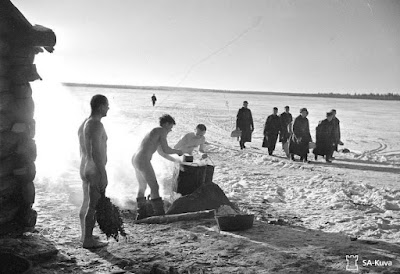Finnish does not go anywhere without saunas, including the war.
The word sauna is an ancient Finnish word referring to the traditional Finnish bath and to the bathhouse itself. In Baltic-Finnic languages other than Finnish, sauna does not necessarily mean a building or space built for bathing.
It can also mean a small cabin or cottage, such as a cabin for a fisherman.
Sauna, hole in the ice, some lakeside, 01.03.1941
The first, hot sauna, and then jump to water, and swim in the lake icy water
Maybe we are not as clean and tidy as the Japanese, but a bit least, to one time a weeks, because then is a sauna day... ...if we are found slightly the water.
Sauna, Petsamo 14. 04.1942 (smoke sauna)
The first Finnish saunas are what nowadays are called savu-saunas, or smoke saunas.
Winter swimming
These differed from present-day saunas in that they were heated by heating a pile of rocks called kiuas by burning large amounts of wood about 6 to 8 hours, and then letting the smoke out before enjoying the löyly , or sauna heat. A properly heated "savusauna" gives heat up to 12 hours
-----------------------------------------------------
Sauna (/ s ɔː n ə / or / s aʊ n ə /: Finnish pronunciation: [sɑunɑ]) is a small room or house designed as a place to experience dry or wet heat sessions, or an establishment with one or more of these facilities
As a result of the Industrial Revolution , the sauna evolved to use a metal woodstove, or kiuas [ˈkiu.ɑs], with a chimney. Air temperatures averaged around 70–90 °C (158–194 °F) but sometimes exceeded 100 °C (212 °F) in a traditional Finnish sauna. When the Finns migrated to other areas of the globe they brought their sauna designs and traditions with them.
14.10.1941 Kolitsajoki the old demarcation line, forest-sauna
The attack phase. This sauna are captured from Russians
9.9.141 Rukajärvi Field-sauna (frontline-sauna)
8.6.1942. Juustijärvi sauna
In Europe , the Nordic countries have a sauna tradition. The Finnish sauna culture is well established, there are built-in-saunas in almost every house in Finland. The oldest known saunas in Finland were made from pits dug in a slope in the ground and primarily used as dwellings in winter.
The sauna featured a fireplace where stones were heated to a high temperature. Water was thrown over the hot stones to produce steam and to give a sensation of increased heat. This would raise the apparent temperature so high that people could take off their clothes.
9.6.1942 Svir. Regiment Headquarters sauna
14.5.1942, crew sauna
---------------------------------
In Mexico and Central America, more specifically in the highlands of central and southern Mexico and Guatemala , there is a version of the sauna indigenous to the Americas, called a temazcal. It is the Mexican, Central American version of the sweat lodge used by indigenous peoples of the Americas, though the temazcal is usually made of clay or stone rather than wood.
Archeological sites in Greenland and Newfoundland have uncovered structures very similar to traditional Scandinavian farm saunas, some with bathing platforms and "enormous quantities of badly scorched stones
21.6 1942 pioneer battalion company commander sauna, officers built
28.06.1942 road construction company and commander sauna
soldiers and inspired shower
12.06.1944 Brigade Commander sauna, close to the front line
The right side: 12.06.1944 Brigade Commander apartment, close to the front line
16.7.1941 Ponkajärvi
Vilma river 10.12.1941 Alakurtti smoky-sauna
Winter War Battle front door of sauna, 03.14.1940 Major Hakanen
















Moi Rodger.
VastaaPoistaHello
This "bath step" was a long trench warfare phase
Trench warfare (as ww-i in Europe) began in October 1941
when Finland to stop the attack
and ended on 06/08/1944 Soviet major offensive.
when the lines to stabilize
remote scouting (Finland)
as well as partisan as well as Desant activities (the Soviet Union)
Behind enemy lines
Soviet partisans conducted a number of operations in Finland and in Eastern Karelia from 1941 to 1944.
The major one failed when the 1st Partisan Brigade was destroyed in the beginning of August 1942 at Lake Seesjärvi.
Partisans distributed propaganda newspapers, Pravda in Finnish and Lenin's Banner in Russian.
One of the leaders of the partisan movement in Finland and Karelia was Yuri Andropov.
Great post. I love a sauna and then a plunge in the ice water
VastaaPoistaMoi, S-K
PoistaNice to hear to your
Thanks to comment, my friend,
from cheerful and happiness green island
and remember, swimming to icy water make good to you health
and improve many disease (preventable)